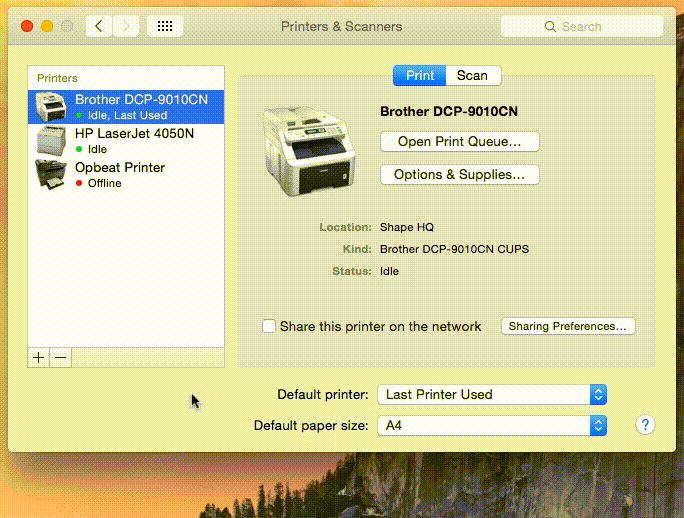ipp-printer
v1.0.0
Published
Create a printer on the network
Downloads
2,448
Maintainers
Readme
ipp-printer
Create a printer on your network using nothing but Node.js. This module implements version 1.1 of the IPP protocol and uses Bonjour/Zeroconf to advertise a printer on your local network that anyone can print to.
For a video introduction, check out the talk I gave at Node.js Interactive 2015 in Portland.

Project Status
This module have been confirmed to work with both OS X and Windows clients. But if you experience any problems please don't hesitate to open an issue.
Be aware that this module currently doesn't support any of the security features build into IPP, so don't print anything you don't want others to know on an open network.
Installation
Install globally to use CLI:
npm install ipp-printer -gOr install locally to use in your project:
npm install ipp-printer --saveCLI Usage
Just run:
$ ipp-printerThe printer will now advertise it self on the network using Bonjour/Zeroconf and write all jobs to the current working directory.
Programmatic Usage
var fs = require('fs')
var Printer = require('ipp-printer')
var printer = new Printer('My Printer')
printer.on('job', function (job) {
console.log('[job %d] Printing document: %s', job.id, job.name)
var filename = 'job-' + job.id + '.ps' // .ps = PostScript
var file = fs.createWriteStream(filename)
job.on('end', function () {
console.log('[job %d] Document saved as %s', job.id, filename)
})
job.pipe(file)
})API
Class: Printer
new Printer([options])
The Printer object can be initialized with either the printer name as a string or an object containing:
name- Name of the printer (default:Node JS)port- Port the printer should listen on (defaults to a random available port)zeroconf- Boolean. Iftrue, the printer will advertise it self on the network using Bonjour/Zeroconf for easier setup (default:true)fallback- Boolean. Iftrue, responses to IPP/1.0 requests will identify them selfs as coming from an IPP/1.0 server. This shouldn't be necessary in a perfect world, but some versions of Windows doesn't like connecting to a server running a different version of the IPP protocol than it self (default:true)
Note that the IPP standard specifies port 631 as the default IPP port, but most IPP clients are fine with connecting to another port.
Event: job
function (job) {}Emitted each time a new job is sent to the printer. The job is an
instance of the Job class.
Example writing a print job document to a file:
printer.on('job', function (job) {
var filename = 'job-' + job.id + '.ps' // expect Postscript
var file = fs.createWriteStream(filename)
job.on('end', function () {
console.log('written job to', filename)
})
job.pipe(file)
})Event: operation
function (operation) {}Emitted each time a new IPP operation is received. This event is more low level than the job event as it will be emitted on all incoming IPP operations.
This module currently supports the minimum set of operations required by the IPP standard:
- print-job (0x02)
- validate-job (0x04)
- cancel-job (0x08)
- get-job-attribtes (0x09)
- get-jobs (0x0a)
- get-printer-attributes (0x0b)
The operation object have the following properties supplied by the
printer client:
version- An object containing the major and minor IPP version of the request (e.g.{ major: 1, minor: 1 })operationId- The id of the IPP operationrequestId- The id of the IPP requestgroups- An array of IPP attribute groups
See the ipp-encoder for an explanation of the different operation types.
printer.name
The printer name.
printer.port
The port of the printer is listening on.
printer.jobs
An array of all jobs handled by the printer.
printer.server
An instance of http.Server.
Class: Job
A job is a readable stream containing the document to be printed. In many cases this will be in Postscript format.
Event: cancel
function () {}Emitted if the job is cancelled prior to completion.
Event: abort
function () {}Emitted if the job is aborted prior to completion.
Event: error
function (error) {}Emitted if the job encounters an error.
job.id
The id of the job.
job.state
The job state.
See the ipp-encoder for an explanation of the job states.
job.uri
The job URI.
job.name
The document name.
job.userName
The name of the requesting user.
job.attributes([filter])
Returns an array of job attributes.
If an array of attribute names or attribute groups is given as the first argument, the returned array will only include the attributes maching the supplied names or groups.
Attributes example:
[
{ tag: 0x45, name: 'job-printer-uri', value: 'ipp://watson.local.:3000/' },
{ tag: 0x45, name: 'job-uri', value: 'ipp://watson.local.:3000/1' },
{ tag: 0x42, name: 'job-name', value: 'My Document Title' },
{ tag: 0x42, name: 'job-originating-user-name', value: 'watson' },
{ tag: 0x44, name: 'job-state-reasons', value: 'none' },
{ tag: 0x21, name: 'time-at-creation', value: 40 },
{ tag: 0x47, name: 'attributes-charset', value: 'utf-8' },
{ tag: 0x48, name: 'attributes-natural-language', value: 'en-us' }
]See the ipp-encoder for an explanation of the tag values.
Debugging
To see the communication between the client and the server, enable
debugging mode by setting the environment variable DEBUG=ipp-printer.
If you open an issue because the module crashes or if the client cannot communicate properly with the printer it helps a lot if you attach the client/server communication to the issue.
License
MIT

